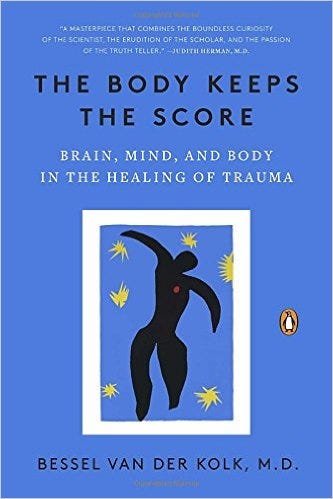The Tale of Two Voices: EMDR Therapy’s Healing Journey
---
Me: "Eye Movement Desensitization and Reprocessing? You know that is an anagram for DREAM, right?"
Therapist: "You know, I never thought of that before, but you're right!"
Me: "This is the same building I worked in as an insurance agent almost 15 years ago. It's just a couple of floors above your office."
Therapist: "Oh wow, funny how things come full circle!"
Me: "So, tell me, how is EMDR any different than regular talk therapy?"
Therapist: "Good question. Talk therapy allows people to tell their story as an event that happened in the past rather than something they are experiencing in the present. Without these stories, memories become frozen, and without memory, you can't imagine how things can be different.
EMDR was discovered by accident. Dr. Francine Shapiro was watching squirrels run around one day while reliving some disturbing thoughts. Then, she noticed something. The back-and-forth movement of her eyes reduced the intensity of her traumatic memory. She became fascinated by this insight and started experimenting with eye movement to treat her PTSD patients, many returning from war.
When the body enters REM sleep, your mind processes the events of the day, impressing key memories it sees as important while shedding the 'less important' ones.
Sometimes your body and mind aren't at full capacity and can't do this processing. For example, let's say you were off in a war and experiencing high levels of exhaustion. Or a child who didn't have the mental resources to make sense of the traumatic events they experienced. Then, the body's normal processing capacities become stymied. Without the ability to finish processing, these events are relived over and over as if they were still happening in the present.
This means that each time a trigger event occurs (like glass breaking for a victim of a home invasion or fireworks for a veteran), the fight/flight portion of our limbic system (where the memory is stored) becomes activated. You feel just like you did when the burglar broke through the sliding door.
Honestly, we don't know completely how EMDR works, but it has been shown to have up to an 80–90% success rate with PTSD in as little as three sessions."
Me: "Got it. So, how does it all work?"
Therapist: "First, I spend some time getting to know you. Us EMDR therapists aren't like your traditional beard-stroking psychologists sitting in leather chairs saying, 'Interesting.' We are more facilitators.
We believe the body has all the tools necessary to heal itself. But, to accomplish that, we must understand the nature of your trauma and the events surrounding it. For that to happen, I need to hear your story. Then, we can mimic your body's natural REM state (while you stay fully awake) to process those events."
---
Ending up in therapy was not something I'd planned. I'd dealt with one personal hell after another. But life had one more domino to drop, one last capital "F" fear which challenged the core of who I thought I was and landed me in EMDR.
Over the next three sessions, I answered every question the therapist asked: family, life, work, negative thoughts I'd harbored about myself, deepest fears and why I came-the whole nine. We mapped out my family relationship dynamics from grandparents on down. She even had me draw pictures of how I saw my idea of 'self.'
When the day finally arrived for the EMDR portion of the show, I didn't know if I was quite ready. In my teens, my mother experienced rapid personality change, and our family dynamic turned upside down. I was afraid of 'tinkering' with my psyche. What if I ended up changing forever like my mother? Better the devil you know, right?
But those fears were keeping me from fully dealing with the root cause of my depression. As a result, life possessed a dull-gray and generally numb quality. If there was a chance for a two-for-one special that knocked out the present issue and figure out why my passion for life left in the first place, then why not?
After some gentle reassurance (and reading multiple books and peer-reviewed journals), I gave her the green light.
---
Therapist: "I want you to hold these two paddles in your hand. Place your feet flat on the ground, take a deep breath and relax."
She handed me two paddles that looked like miniature computer mice. Wires from the paddles led to a black tripod with a horizontal bar perched on top. A red LED light moved back and forth. It looked like it belonged on the hood of K.I.T.T. from Knight Rider.
Therapist: "Now, exhale."
She told me to watch the light as it moved from right to left on the bar. The paddles in my hand buzzed in sync with the movement.
Therapist: "The light gives your conscious mind something to do while we talk. The eye movement and the buzzing in your hands stimulate both hemispheres of your brain."
As my eyes darted back and forth, she read my own words off a pad of yellow-lined notebook paper that recalled the history of events leading to the onset of my depression years ago.
Back and forth went my eyes. I kept wondering when things would 'happen.'
After about 45 seconds, the therapist spoke,
"Tell me your thoughts."
Me: "Honestly?"
Therapist: "Of course!"
Me: "Well," I began, "my first thoughts were, 'This shit isn't going to work on you. This is like that magician who tried hypnotizing a bunch of kids on stage back in grade school. You got sent back to your seat because you didn't fall into a trance. You're just not the susceptible type'.'"
Therapist (laughing): "I thought you might say that. You know you have a highly developed defense mechanism. It helps you feel in control. When the world feels like it's slipping away, and the pain hurts too deeply, you start to intellectualize things. It's your way of keeping the pain at bay. You prefer to research and figure things out in your head, not your heart. As a result, you end up knowing more about subjects than most people.
It's a handy little coping mechanism because no one questions it-like they do with alcoholics or a child acting out. Let's try again. But this time, instead of thinking about what's happening, focus on where your body feels the discomfort when we discuss the events."
The light came back on.
Back and forth…buzz…buzz…back and forth
The voice inside my head returned, "I told you this isn't going to work, right? How soft do you have to be for this stuff to have any effect? Come on, Matthew. This ain't you! Why are you even here?"
But then something happened.
Another voice appeared.
"Matthew, you know why you are here. You are here because you need help. You are here to set an example for your family. To let them know it is ok to ask for help. To show them that being a man doesn't mean sucking it up and soldiering on. You are here so you can finally heal."
---
If you've ever held your hand over one eye while staring at an object in the distance and then switched eyes and watched the object shift in your field of vision, you'll understand what I am about to tell you.
Just as our brain takes binocular vision and merges them into a single image, for the first time in my life, I realized I'd been living with two distinct and separate voices inside my head. But I believed they were one and the same.
One voice was sarcastic, critical and uncaring, fed by and responding to fear. That was the first one I heard. The second was soft, nurturing and helpful. I'd read of two entities that lived in one character-like Sméagol and Gollum in Tolkien-but I'd never experienced them in such a visceral fashion.
There's an old expression magicians use when talking about revealing their secrets, "Once seen, never unseen."
The same was true of the two voices in my head. Once I could finally tell them apart, I began to notice what cycle of events brought each online. The critical voice stood sentry, always on high alert. Whenever I fed my brain things like the news, the first would appear like a fear genie reminding me of all the bad things that could happen.
The intuitive voice took more effort to hear. I'd have to stop feeding my fear brain, turn everything off, change my breathing and be still. Only then could I hear it.
---
Over the subsequent EMDR sessions, I let go and consciously observed as my mind and body began processing and healing themselves. I was fully awake in a REM state, observing my mind as it connected the dots. It thought the thoughts and processed the lessons in one "Aha!" moment after another-completely unaided by my conscious mind or will. "Oh, so that's why we did that!"
I wondered as I observed my mind thinking and drawing conclusions:
Where are these thoughts coming from?
Do they come from inside or outside of me?
Maybe thoughts are just like stomach grumblings after a heavy meal?
Who or what does the healing?
If I am not the thinker of my thoughts, what is?
If my body and soul can heal themselves (and all it takes is me letting go and getting out of the way), then what does that tell me about the rest of my life?
I never thought of myself as a control freak. After all, I was an entrepreneur. Every day was something new. Things were constantly in change. I loved the excitement.
My wife spoke the truth to me one day in a poignant exchange, "Oh, you love change all right. As long as you're the one driving it!"
Ouch.
---
If choice is a pendulum that swings between opposites of Willpower and Letting Go, then I began my journey at a standstill. After the trauma, in order to regain a feeling of control, I pushed the pendulum as far as it would go in direction of Willpower and dropped anchor. I could accomplish a lot with sheer willpower.
But life had more to teach me. So, the day arrived when an equal-and-opposite reaction decided I'd traveled far enough down that path. Invisible forces pulled me in the direction of Letting Go, but I resisted-for a while.
EMDR showed me the fingertips I was using to hold on and pried them off the ledge for me. As the pendulum swung freely, for the first time in my life, I truly healed-like all the way.
There are moments I still need Willpower to spearhead projects. Willpower and Letting Go exist on a continuum. You can't have one without the other. Other times, I let go and allow the hidden forces of life to do their thing. Now, the pendulum vibrates rather than swings.
Even my critical voice serves a role. I keep him around like a pet dog. He keeps an eye on things. But he also thinks every bump in the night is a panther, so I have to calm him down and let him know things are going to be ok.
As for the nurturing voice, I find her on walks, long drives for work and when I take time for deep, slow breaths. And, for the first time in forever, when I need guidance, I can actually hear her. I've been following her ever since, and she's never led me astray. Not once.
"You are entitled to know that two entities occupy your body. One of these entities is motivated by and responds to the impulse of fear. The other is motivated by and responds to the impulse of faith. Will you be guided by faith or will you allow fear to overtake you?" ― Napoleon Hill, Outwitting the Devil: The Secret to Freedom and Success

